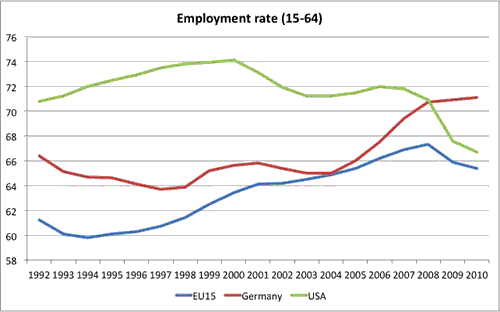Via Mark Thoma I read about the recent failure of the American jobs machine, unable to keep up with the strong dynamics it displayed during the 80s and 90s. After the 2001 recession the performance of the labor market as measured by the number of jobs or the employment rate (employment relative to population) has been much weaker than in the previous two decades. And it is a combination of very limited job creation during the 2001-2007 period and an extremely high rate of destruction during the last recession.
To add an international perspective, here is a comparison between the American, European and German job machines for the last 18 years.

The variable plotted is the employment rate for individuals in the 15-64 age group. During the 90s the US employment rate increased, at a time where the European (and German) employment rate was declining. This was a period where the US economy, in particular its labor market, was used as an embarrassing example for the Europeans. A lot of talk about how high taxes, regulation, lack of mobility in Europe were hurting the European job machine.
But starting with the late 90s we see a reversal of this trend. While the US employment rate flattens and then drops, the European rate, more so the German one, increases and by 2009/10, the German employment rate is above that of the US. Of course, this is just a partial view of the labor market (there are other age groups, there is the issue of number of hours worked), but it illustrates well the change in the performance of the US labor market, not just in isolation, but in comparison with similar economies. And what it is interesting is that this is not just the outcome of the great recession, it is a trend that had started more than a decade ago.
- Bulenox: Get 45% to 91% OFF ... Use Discount Code: UNO
- Risk Our Money Not Yours | Get 50% to 90% OFF ... Use Discount Code: MMBVBKSM
Disclaimer: This page contains affiliate links. If you choose to make a purchase after clicking a link, we may receive a commission at no additional cost to you. Thank you for your support!



Leave a Reply